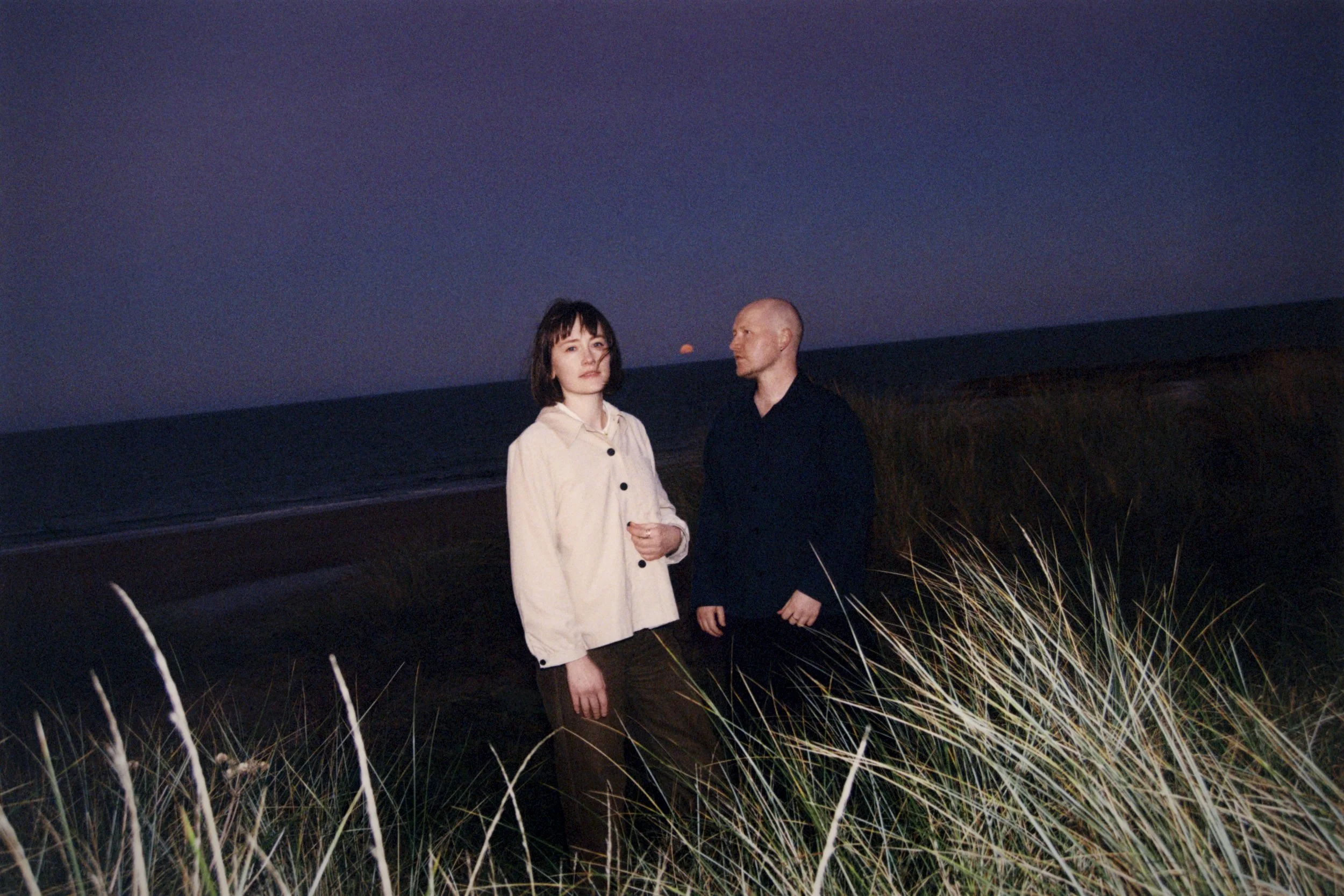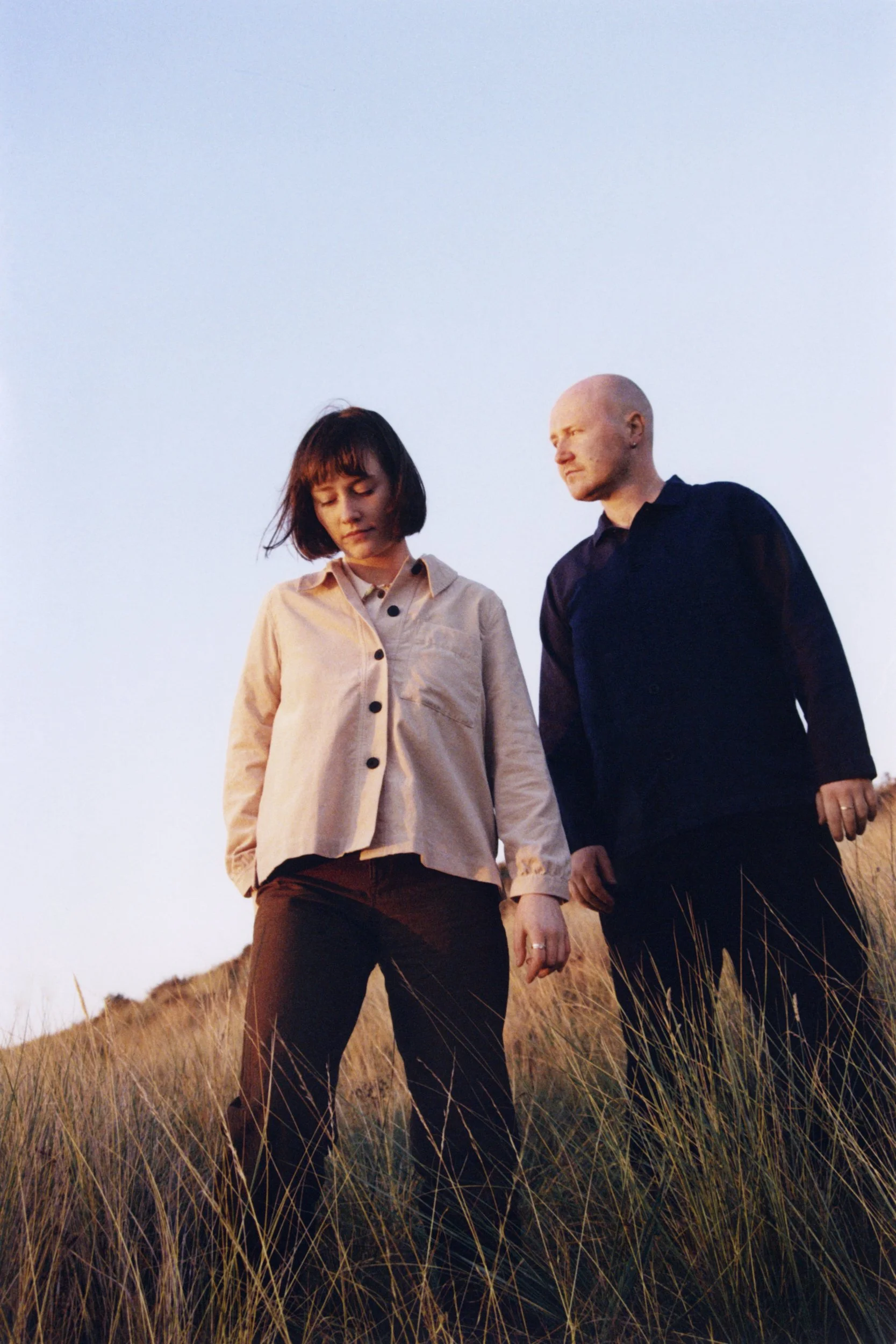Start Listening To: Cloth
The Scottish duo reflect on sonic reinvention, sibling synchronicity, and the emotional undercurrents of Pink Silence.
Glasgow twins Rachael and Paul Swinton, better known as Cloth, return with Pink Silence, their most expansive and emotionally complex record to date. Building on the spacious minimalism of their earlier work, the duo step into bolder sonic territory, enlisting collaborators like Owen Pallett, Adrian Utley and Stuart Braithwaite to help them strike a careful balance between intimacy and scale. Speaking from their studio and live experiences to personal reflections on loss, change and growth, Cloth invite us into the quieter and louder corners of their world.
For those unfamiliar with your music, can you tell us who you are, where you’re from and about the music you make?
We are twins from Glasgow who make alternative rock music. Our music is spacious and atmospheric, but can also be loud and visceral.
Pink Silence is described as a bold reinvention for you both. What drove the decision to push your sound in a bigger, more cinematic direction?
A lot of our music is quite minimal in nature. We’re drawn to things which allow space for individual elements to breathe, so it seemed an exciting challenge to see how we could build things to a more sonically muscular and impactful level whilst preserving that sense of space.
The phrase "Pink Silence" captures a beautiful yet emotionally complex moment. How did this theme shape the record as a whole?
Pink Silence refers to the time, either early in the morning or late at night, when the sun is setting or rising and the sky takes on a mesmerising pink hue. Depending on your frame of mind, that time of the day can feel very tranquil and serene, or quite heavily charged with a sense of ominousness. That duality felt akin to what we were trying to achieve with this album. Pink Silence features some of the heaviest music we’ve made (the title track, in particular) and this co exists with some of our most minimal and stripped-back arrangements (for example, “The Cottage”). We wanted to try and achieve a particular balance between loud and quiet, between light and dark.
You’ve worked with some incredible collaborators on this album, including Owen Pallett, Adrian Utley, and Stuart Braithwaite. What was it like bringing them into the Cloth world?
It was extremely cool! Each one of those musicians is responsible for music we hold very, very dearly so it was surreal to have them contributing to our own songs. Owen’s string arrangements, which feature on 5 songs, had a completely transformative effect on the record, as did the layers of synth and guitar added by Adrian. Stuart added guitar to the title track which was already a large arrangement. His work on it just elevated things to the next level.
Rachael, you mentioned that producer Ali Chant’s advice “the artist always lets go” had a big impact on your approach. How did that mindset shift affect your songwriting and recording?
It took me a while to work out my own interpretation of what ‘letting go’ meant, as Ali didn’t elaborate too heavily on what that looked like in practice. In hindsight, I think this was intentional on his part as it encouraged me to work things out for myself and begin adjusting some of my usual processes. I think, ultimately, I ended up working more instinctually and not overthinking things.
This ended up being really liberating during the writing and recording processes as it resulted in capturing certain feelings and emotions, which sometimes get lost when you work on an idea for too long.
Paul, you’ve spoken about writing lyrics that explore loss, friendship, and self-improvement. Were there any particular moments or experiences that sparked these themes on Pink Silence?
I found myself dwelling on the fact it’s so strange that a friendship can burn so brightly with so many shared experiences, only for life to get in the way and for things to drift apart. You still have all these cherished memories, and that person is still out there, but a vital part of your connection has been eroded. I’ve experienced this a few times in my life. ’Polaroid’ is all about that sense of loss.
“Polaroid” stands out as a more immediate, fast-paced song for you. Was writing something so direct a challenge, or did it feel natural?
We went into writing that song knowing we wanted to make something more fast-paced than anything we’d done previously, so in that sense it was a fun challenge - purely because it was different territory for us. Once we had the bare bones of the structure written, the process of adding drums and strings was really exciting - everything feels so much more dialled-up and immediate when you’re working at that tempo.
“Stuck” builds on themes you explored in Secret Measure, particularly around OCD. Was revisiting that subject a conscious decision, or did it emerge naturally in your writing?
It was definitely something that came about naturally. Most of Secret Measure dealt with trying to find a way to assure myself (Paul), rather than rely on others for reassurance, as OCD is something that can rob you of that power. I’m in a good place with things now but that’s a journey I’m still on so I think it’s natural that some of those feelings made their way into this record.
Rachael, you’ve mentioned Squarepusher’s Tommib as an inspiration for “The Cottage.” Are there any other left-Field influences that shaped the album?
Portishead’sThird was a source of continual inspiration when we were writing Pink Silence. I always try to shape things - whether it’s a melody or a drumbeat etc. - in non-typical ways which would make me feel excited to listen to them. On Third, nothing feels predictable or reliant on musical tropes - everything is so innovative and fresh-sounding. I really wanted to strive for that approach on Pink Silence.
You’ve spoken about the importance of live energy in shaping these songs. How did thinking about the live setting change your approach in the studio?
We went to Ali’s studio for a few days of pre-production around a month before the proper recording began. During that time, we rehearsed the songs with drummer Matt Brown, with Ali playing bass and sampler. We tracked some of our live run-throughs because we were getting such a great energy in the room, and some of those takes ended up forming the basis of the finished songs. This was a bit of a first for us as we’re used to multi-tracking things. We knew that capturing the live energy was really important this time round as we wanted the finished record to make people feel excited to come and experience the album in a gig setting.
Paul, you’ve described being obsessed with vocal melodies and song construction. Are there any moments on Pink Silence where you feel you really nailed that perfect balance?
I’m really proud of the song “Stones”. It’s quite a tightly constructed track with a kind of early Phoebe Bridgers vibe. Rachael and I knew we wanted to have a big, soaring chorus melody and, though it took a while to crack that nut, we were happy with how it turned out. It also features an incredibly poignant string arrangement from Owen Pallett which I feel accentuates all of the song’s nuances in just the right way.
As siblings who’ve been making music together since childhood, how has your creative partnership evolved over three albums?
We’re very trusting of each other when one of us feels like there is an idea worth pursuing - even if it might not initially feel that way to the other! We’re also more tuned into each others tastes and sensibilities than ever before which is good as it informs the kind of ideas we each bring to the table, and the kind of references we draw on when recording.
What do you love right now?
The album Eels by Being Dead.
What do you hate right now?
Eating healthily. We’re not long back from SXSW where we experienced proper Texas BBQ for the first time as well as the best tacos we’ve ever had. Coming back from that to healthier eating habits is proving difficult.
Name an album you’re still listening to from when you were younger and why it’s still important to you?
We both love the album Next Thing by Frankie Cosmos and revisit it all the time. That record was really eye-opening for us in terms of what a song could be - it could be short, it could be long, it could have multiple tempo changes etc. Playing with form in that way was really inspirational to us and had a direct effect on some of our earlier songs.


